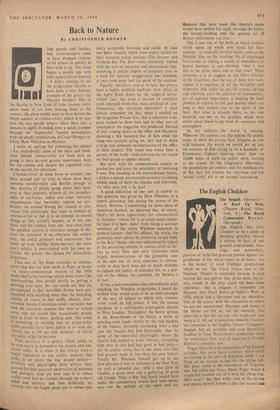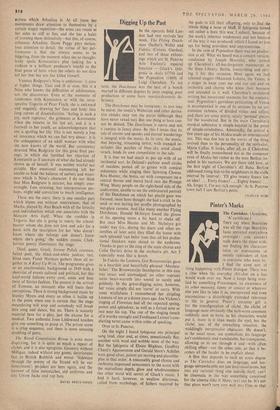The English Chekhov
The Seagull. (Queen's.) - A Kayf Up West.
(Theatre Royal, 'Strat- ford, E.)—The Royal
Commission Revue. (Mermaid.) THE English like their Chekhov to be a study in decaying gentility, almost a mirror, in fact, of our general predicament. Nos- talgia and melancholy, gestures of futile but gracious protest against the grindstone of life which wears us all away; this is the kernel of most Chekhov productions which we see. The Uncle Vanya now at the National Theatre is successful because it goes beyond this and proves that, given these charac- ters, events in the play could not have been otherwise: this is tragedy. 1 remember the Moscow Arts Three Sisters at Sadler's Wells in 1958, which had a fierceness and an identifica- tion of the actors with the characters to which we are not accustomed. Mistiness and lumps in the throat are for us, not the certainty that since life is like this we can only laugh and then weep at it. All our irresolutions towards Chekhov are contained in the English Theatre Company's Seagull, but all tactfully and even beautifully handled in Tony Richardson's production along the traditional lines, and all depicted in Jocelyn Herbert's romantic sets.
Peggy Ashcroft is an incarnation of the English attitudes. Her voice has a stridency which needs no fOreing in the part of Arkadina, while I can think of no actress so apt for the dying fall. Her great scene is the reconquest of Trigorin, who has fallen for Nina; Dame Peggy makes a wonderful moment out of it with her cheap leer, 'He's mine!' She then walks over to the mirror and preens herself before it like the second-rats
actress which Arkadina is. At all times her movements draw attention to themselves by a certain stagey repetition—the arms can rotate at her sides as stiff as fins, and she has a habit of crossing them defensively—but this, of course, enhances Arkadina. Dame Peggy pays meticu- lous attention to detail; the virtue of her per- formance is that she always seems to be fidgeting, from the moment when she so thought- lessly spoils Konstantin's play (asking for a cushion is a brilliant producer's touch) to the final game of lotto when the others do not dare tell her that her son has killed himself.
Vanessa Redgrave's Nina is ambitious: it aims at higher things. Taut and ill at ease, this is a Nina who knows the difficulties of adolescence, not the discoveries. Even at the moments of tenderness with Konstantin or with the intro- spective Trigorin of Peter Finch, she is awkward and ungainly, drawing her face and body into long curves of dissatisfaction. 'Acting is such a joy, such raptures,' she grimaces at Konstantin when she returns in the last act, and it is a farewell to her youth, an acknowledgement that she is spoiling her life. This is not merely a loss of innocence which we can feel wry about : it is the unhappiness of an adult woman with what she now knows of the world. But consistency deserted Miss Redgrave for this great final pas- sage, in which she fumbled her rejection of Konstantin as if unaware of what she had already shown us of herself. It was neither wistful nor pitiable. Her emotional stammering left her unable to hold the balance of naivety and weari- ness which is Nina's character. I do not think that Miss Redgrave is miscast, but simply over- wrought. Less straining, less interpretation per- haps, might add conviction to much intelligence.
These are the stars; there is one smaller part which blazes out without reservations, that of Masha, played by Ann Beach with all the ferocity and individualism which one associates with the Moscow Arts itself. When she confides in Trigorin that she is going to marry the school- master whom she does not love and asks for a book with the inscription for her `who doesn't know where she belongs and doesn't know where she's going,' the sudden cosmic Chek- hovian poetry illuminates the stage.
Thief, queer, Greek, former Polish countess, failed poet, the black-and-white junkies, tart, blind man, Frank Norman gathers them all to- gether in A Kayf Up West. The programme gives us an anachronistic background to 1949 with a short-list of events cultural and political, but this kayf-world follows every cool, snide and beat twist of Sixties fashion. The pretext is the arrival of Tommie, an innocent who will learn their corruptions. There is strong background music by Stanley Myers and every so often it builds up to the point when one is certain that the stage meandering will stop and somebody will break into song and dance, but no. There is scarcely material here for a play, just the excuse for a musical. Two authentic Joan Littlewood touches give one something to grasp at. The prison scene is a crisp sequence, and there is some amusing doubling of parts.
The Royal Commission Revue is even more dispiriting, for it is quite as much a repeat of clichds and it is also egregious. Goonery without Milligan, indeed without any goons, deteriorates fast to British Rubbish and worse. 'Sideways through the sewers of the Strand will be our honeymoon'; po-jokes are here again, and the humour of false moustaches, old uniforms and tiny Union Jacks and top hats.
DAVID PRYCE-JONES









































 Previous page
Previous page